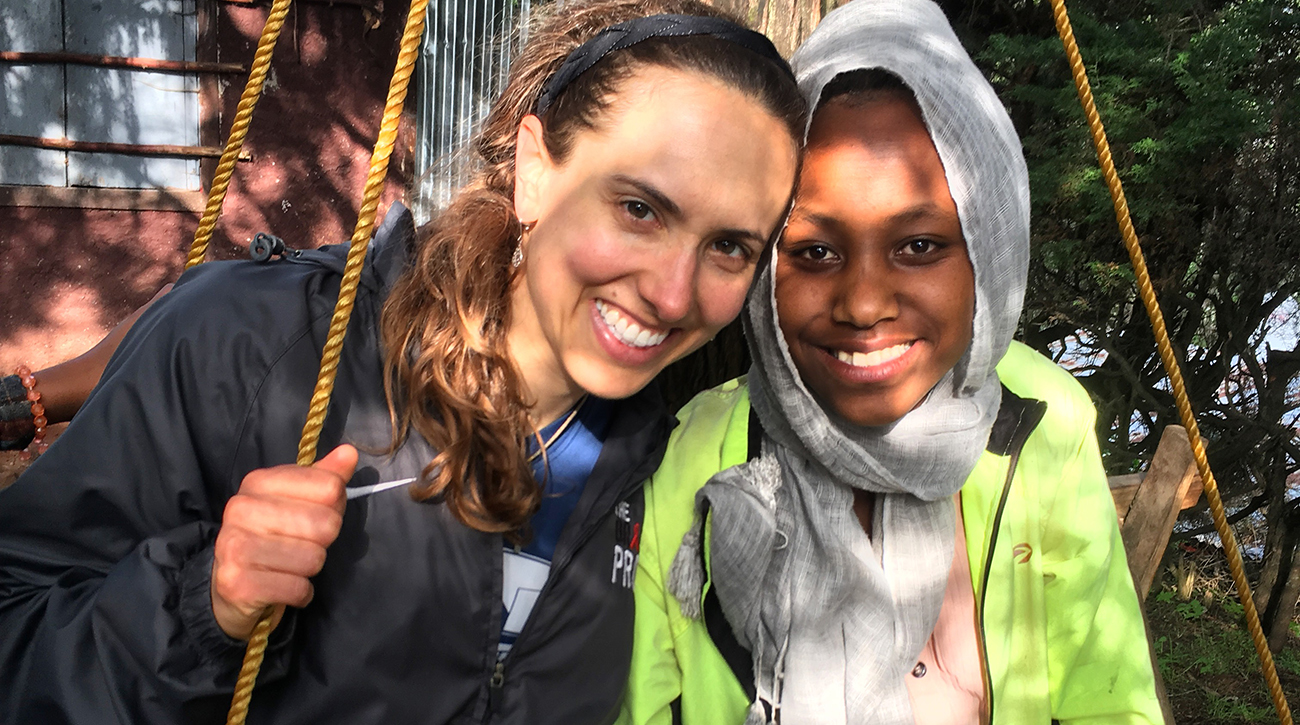This article was written by Melissa Otterbein, a second-year graduate student in the Physical Activity in Public Health program, a graduate assistant in the Department of Exercise & Nutrition Sciences and a certified USA Triathlon Coach and USA Swimming Coach.
A loud knock was my daily 6 a.m. wake-up call this summer in Bekoji, Ethiopia. “Come, come!” Girls Gotta Run Foundation (GGRF) Head Coach Fatyia Abdi would shout as dawn peered through my window with the day’s lone bits of sun before the rainy season afternoon storms.
I spent the summer completing my practicum as a monitoring and evaluation intern with GGRF, a nonprofit dedicated to empowering girls and their communities through running and education. According to UNESCO, over one million girls in Ethiopia are not in school due to factors such as early childhood marriage, financial barriers, family disapproval and increasing domestic duties. During adolescence, girls are especially vulnerable to school dropout due to community perception of being ready to focus on marriage and childrearing. Investing in girls’ education during adolescence is a critical time to build pathways out of poverty.
According to the World Bank, when females earn income, they are likely to reinvest 90 percent of it into their families. Additionally, an extra year of secondary school for girls can increase their future earnings by 10 to 20 percent. Education, combined with economic development, along with the provision of social networks, increased self-esteem, and self-efficacy via physical activity creates empowerment.
GGRF provides such pathways for girls by running workout sessions along with weekly life skills curriculum focused on healthy relationships, leadership development, economic empowerment and health education. The girls’ mothers also meet weekly for a savings and entrepreneurship group meeting in which the women use the capital created through the business development workshops to support their own businesses and families.
Some of the most transformative moments working with GGRF this past summer included conducting family interviews with the girls’ mothers. Many reported living with HIV or expressed regret at not being able to complete their education due to early marriage.
But there is a generational shift happening. In conducting post-program assessments with the girls, several laughed when asked if they were currently married, signaling a change towards enhanced opportunities. Additionally, a mere 37 percent of the girls thought of themselves as a leader in pre-program surveys, whereas 92 percent identified themselves as a leader after completing the program.
Working with GGRF this past summer I was able to advance my career goal of furthering the field of sport for development and peace. For example, as part of my practicum experience, I created a strategic plan in which I detailed how GGRF addressed 11 out of the 17 Sustainable Development Goals (SDGs), as defined by the United Nations General Assembly. (Exploring the SDG indicators as it pertained to programs using sport to promote development provided the backbone for my upcoming Global Health Mini-University presentation on the “Sustainable Development Goals and Physical Activity: Advancing the Power of Movement” on October 22, 2018.) I was able to further my understanding of how organizations are addressing SDGs globally by conducting site visits with Public Health Ambassadors Uganda, which focuses on sexual health education through play, drama, dance, flash mobs and health education.
Through my practicum and field experiences in East Africa, I gained skills in the design, implementation and evaluation of sport for development programs that I gratefully carry forward into the second year of my MPH program in physical activity. And, as a triathlete, I will always remember the summer when I had the privilege of running alongside young female leaders. I returned to Washington, DC, inspired by the youth of Bekoji, Ethiopia, and Wakiso, Uganda, and ready to address sexual and reproductive health and development through sport in my future career.


